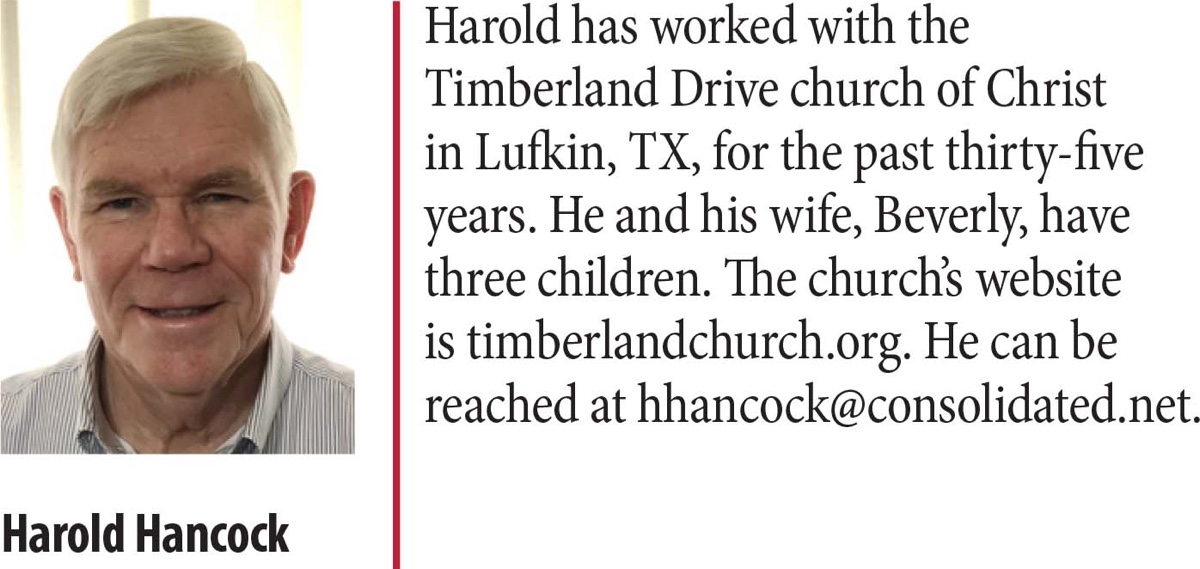
by Harold Hancock
Synopsis: This article represents a study of the New Testament word, “fellowship,” contrasting its biblical usage with the modern day views which emphasize social and secular activities.
To many in the world, and even to some in the church, most forms of association and everything done together is “fellowship.” It matters not if it is eating together, sharing conversation over a cup of coffee, or doing a good deed for another—to these people, it is “fellowship!” The New Testament uses the word “fellowship,” but its use is far more restricted and limited than the modern view just expressed.
In the New Testament, the word “fellowship” is most often translated from the Greek word, koinonia (cf. Acts 2:42; 1 Cor. 1:9; 2 Cor. 6:14; 8:4; Gal. 2:9; Eph. 3:9; Phil. 1:5; 2:1; 3:10; 1 John 1:3, 6, 7). This Greek word may also be translated “contribution” (Rom. 15:26), “communion” (2 Cor. 10:16; 13:14), or “sharing” or “to share” (Phile. 6; Heb. 13:16).
Under the heading of “Communion,” The New Bible Dictionary deals with these words translated from the Greek, koinonia, and quotes A.R. George from his book, Communion With God in the New Testament: “The important thing is that these words (belonging to the koin- family) refer primarily, though not invariably, to participation in something rather than association with others: and there is often a genitive to indicate that in which one participates or shares” (George, 133; Martin, 233).
The statement by A.R. George seems to be proven true when the New Testament passages on fellowship are carefully considered. The Christian has, or can, have fellowship with God (1 John 1:3, 7), with Christ (1 Cor. 1:9; 1 John 1:7), with the Holy Spirit (2 Cor. 13:14), with other Christians (1 John 1:7), in the Lord’s Supper (1 Cor. 10:16), in the ministering to saints (2 Cor. 8:4), in the gospel (Phil. 1:5), in the sufferings of Christ (Phil. 3:10), and in the mystery of Christ (Eph. 3:1-10, esp. v. 6). However, John makes it plain that our fellowship with God, Christ, and fellow-believers is established by our hearing and accepting the message of the apostles (1 John 1:3) and by walking in the light (1 John 1:7). This requires believing in Jesus Christ, putting Him on in baptism, and sharing in the work and worship done in His name. This fellowship is more than association—it demands a participation in Christ.
Perhaps the Christian’s relationship to the world further emphasizes that fellowship is more participation than association. Christians are in the world and must often associate with people of the world through family, work, school, and social events (1 Cor. 5:10). Many individuals with whom Christians associate may not be in Christ; some of these people may at times willfully engage in sinful practices. They are perhaps a part of a false religion. Mere association with these people does not constitute biblical “fellowship” with them or with their sinful deeds. Christians have “fellowship with the unfruitful works of darkness” when they participate in sinful activities (Eph. 5:11). They have “fellowship” with a false religion when they participate in that religion, or give consent or approval to those things that are false (2 John 2:9-10). It is important that we understand that not all association is fellowship. It is important that we distinguish between the world’s use of “fellowship” and the New Testament use of “fellowship.”
Notice, also, how true it is that in the New Testament “there is often a genitive to indicate that in which one shares.” This is reflected in most of the New Testament passages related to fellowship. Consider a few examples:
1 John 1:3 says, “That which we have seen and heard we declare to you that you may have fellowship with us; and truly our fellowship (a fellowship is stated, HH) with the Father and with His Son Jesus Christ” (the genitive showing the area of fellowship is named, HH).
1 Corinthians 10:16 says, “The cup of blessing we bless, is it not communion” (a statement of fellowship, HH) of the blood of Christ (the genitive showing the area or thing in which we have fellowship, HH). The bread which we break, is it not communion” (a statement of fellowship, HH) of the body of Christ” (the genitive showing the area or thing in which we have fellowship when partaking of the bread, HH).
Philippians 1:3-5 says, “I thank my God upon every remembrance of you, always in every prayer of mine making request for you with joy, for your fellowship (a statement of fellowship) in the gospel” (the genitive showing where and what the fellowship was in, HH).
This pattern holds true for most, if not all, of the New Testament passages speaking of fellowship. It is also worth noting that at no time does the New Testament speak of “fellowship” with a genitive of mere social interaction.
One passage that needs to be examined further is Acts 2:42, which says, “They continued steadfastly in the apostles’ doctrine and fellowship, in breaking of bread, and in prayer.” Many read this as if early Christians continued in four things: (1) the apostles’ doctrine; (2) fellowship; (3) the breaking of bread (i.e., the Lord’s Supper [Acts 20:7]), and (4) prayer. Many feel free to define “fellowship” in this passage as it is used in modern vernacular—social interactions or eating common meals together. Acts 2:46, which says, “So continuing daily with one accord in the temple and breaking bread from house to house, they ate their food with gladness and simplicity of heart, praising God and having favor with all the people,” is often cited for support of this position. However, Acts 2:46 no more defines the “fellowship” mentioned in Acts 2:42 than it does “the apostles’ doctrine,” or the “prayer” of Acts 2:42. It is not hermeneutically sound to choose arbitrarily Acts 2:46 as the definition of “fellowship” in Acts 2:42. It is not hermeneutically sound to take what was done “from house to house” and make it a congregational work of the church.
May we suggest that when one considers that “there is often a genitive to indicate that in which one participates or shares” and the structure of Acts 2:42, the “fellowship” spoken of is that found in taking the Lord’s Supper. The text says, “And they continued steadfastly in the apostles’ doctrine and in fellowship,” “in breaking of bread” (notice there is no “and” introducing this phrase as there is in the preceding phrase and following phrase), “and in prayer.” “In breaking of bread” is descriptive of the fellowship, not something separate and apart from the fellowship. Scriptures Note further: “And they continued steadfastly in the apostles’ doctrine and in fellowship” (a statement of fellowship), ”in breaking of bread” (the genitive showing the area of fellowship), ”and in prayer.” This fits the pattern already noted with the other “fellowship” passages: “there is often a genitive to indicate that in which one participates or shares.” This same truth is taught in 1 Corinthians 10:16, which affirms that we have communion, or fellowship, with the body and blood of Jesus when eating the bread and drinking the cup.
We should not take lightly the fact that the word “fellowship” (koinonia) is used in Scripture in specific ways: It describes the Christian’s relationship with God, Christ, the Holy Spirit, and fellow-disciples. It refers to the worship and works done together in Christ and for Christ. Let us not misuse it in referring to other common relationships and deeds, while ignoring the genitives given to “fellowship” in the biblical context. Don’t be fooled by such sophistry! The word “fellowship” as used in the New Testament, in no way authorizes churches to build or maintain fellowship halls and recreational centers.
It is good and desirable that Christians associate together socially, but that association is not referred to as “fellowship” in the Scriptures (Acts 2:46). The “fellowship” spoken of in the Scriptures is greater than that; it describes our relationship with God, Christ, the Holy Spirit, and fellow-Christians, and our participation together in the worship and works of faith. 
Martin, R. P. “Communion.” New Bible Dictionary. Edited by D. R. W. Wood et al. Leicester, England; Downers Grove, IL: InterVarsity Press, 1996.


